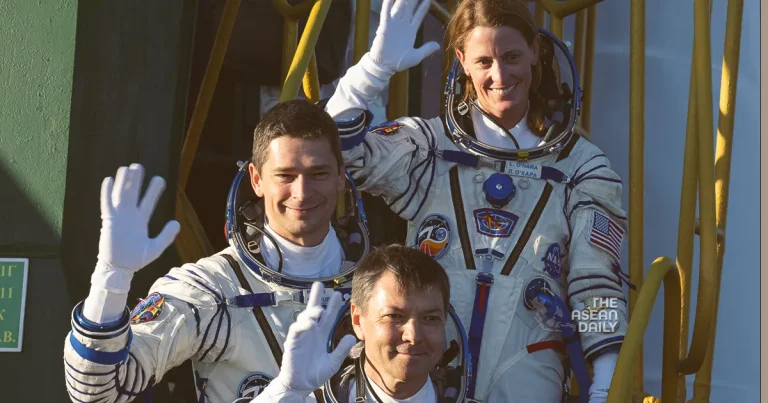16-9-2023 (MOSCOW) Amidst escalating tensions between Moscow and Washington over Ukraine, two Russian cosmonauts and an American astronaut successfully docked with the International Space Station (ISS) on Friday. Their journey began with a launch from the Baikonur cosmodrome in Kazakhstan aboard the Soyuz MS-24 spacecraft.
Cosmonauts Oleg Kononenko and Nikolai Chub from Roscosmos, alongside NASA astronaut Loral O’Hara, completed the docking at the ISS approximately three hours after liftoff, as confirmed by the Russian space agency.
At the orbiting station, this trio will join an international crew, including three Russians, two Americans, a Japanese astronaut, and a representative from the European Space Agency.
This mission took place in the backdrop of Russia’s recent lunar mission failure, marking its first lunar attempt in nearly five decades. The success of the ISS mission stands out as a rare instance of cooperation between the United States and Russia, whose diplomatic relations have been strained since Russia’s offensive in Ukraine last year.
During a pre-flight press conference on Thursday, Kononenko alluded to these geopolitical tensions by highlighting the unique bond between cosmonauts and astronauts in space. He emphasized their mutual care and support, saying, “We hear each other there, and we understand each other, and we are very sensitive to our relationships. We always take care of each other.”
Loral O’Hara commended the ISS for its enduring legacy, stating that it has played a crucial role in bringing nations together. She expressed her excitement about joining the crewmates who were awaiting their arrival.
Notably, Kononenko, aged 59, and Chub, aged 39, were scheduled for a year-long stay on the ISS, while O’Hara, aged 40, would spend six months on board. This mission marked the first spaceflight for both O’Hara and Chub. Chub described traveling to space as his “childhood dream” and a goal he had dedicated his entire life to achieving.
This crew succeeded Russian cosmonauts Dmitry Petelin and Sergey Prokopyev, as well as NASA astronaut Frank Rubio, who had spent a year aboard the ISS. Their return to Earth had initially been planned for March, but the mission was extended due to damage sustained by their vessel, the Soyuz MS-22, following a suspected tiny meteoroid impact. They are now set to return on the Soyuz MS-23, as confirmed by Roscosmos.
Meanwhile, as condemnation and sanctions against Moscow continue to mount over its actions in Ukraine, Russian President Vladimir Putin is seeking to strengthen space cooperation with China. He recently hosted North Korea’s leader, Kim Jong Un, at Russia’s new Vostochny spaceport, where they discussed the possibility of sending a North Korean into space.
Last month, Russia faced a significant setback when its Luna-25 module crashed on the Moon’s surface during pre-landing maneuvers. This incident marked a substantial embarrassment for Russia, as the mission was intended to signify its return to independent lunar exploration, amidst financial troubles and corruption scandals, as well as growing isolation from Western nations. Russia’s previous successful lunar probe landing occurred in 1976, after which the focus shifted towards missions to Venus and the construction of the Mir space station.




